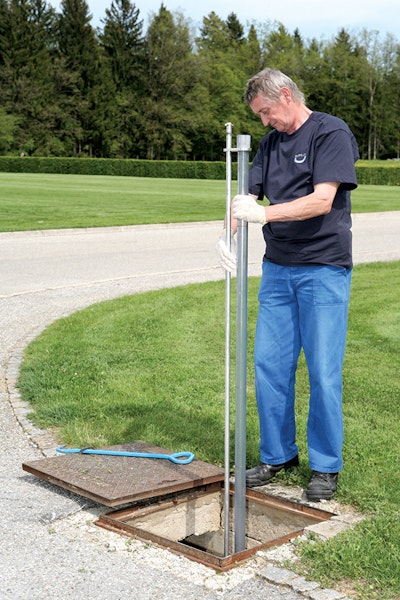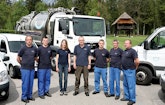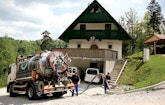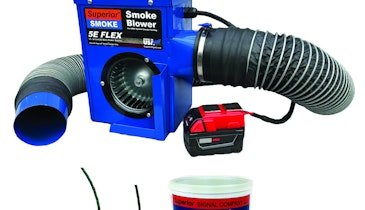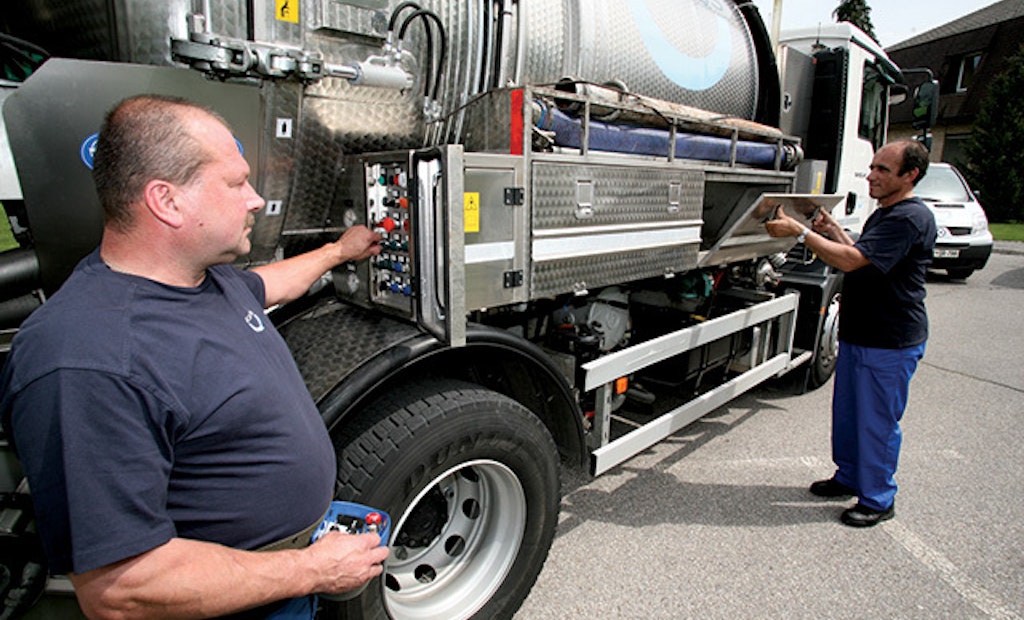
Interested in Plumbing?
Get Plumbing articles, news and videos right in your inbox! Sign up now.
Plumbing + Get AlertsThe Republic of Slovenia is thousands of miles from the United States. But aside from the distance, there's not much separating BIOPLUS d.d.o., a grease trap and drain line cleaner in the south central European country, from its counterparts in the United States.
Led by owner Mihael Habicht, the company follows a formula familiar to successful U.S. pumpers: Use advanced technology to boost productivity, reduce the cost to customers and enhance client satisfaction; promote preventive maintenance contracts to ensure a steady income and minimize expensive, disruptive emergency calls; diversify service offerings to capitalize on an existing customer base; and provide top-notch customer service.
Habicht established the company in 1997 in Skofja Loka, a city near the capital of Ljubljana. At the time, the business focused only on bioremediation, a process that uses microorganisms to naturally remove unwanted organic material from grease traps and drain lines, which in turn reduces clogs and backups.
STEADY AS SHE GROWS
Growth occurred steadily. Today, the company serves about 400 clients in a country that's a little smaller than New Jersey and with a population of about 2 million. Over the years, BIOPLUS also diversified by expanding into pumping grease traps and cleaning drain lines. As such, employment increased to 10 workers and the company now owns a small fleet of vehicles and equipment.
About 70 percent of the company's sales volume comes from maintenance contracts for bioremediation treatment. Grease trap pumping and drain line cleaning accounts for most of the remaining 30 percent.
"One of our main challenges is how to get a business base that is large enough to develop the company profitably," says Habicht, who travels to the U.S. to attend the Pumper & Cleaner Environmental Expo. "We have to diversify if we want to be successful because otherwise there's not enough business volume (in such a small country)."
So far, the formula is working. In 2011, BIOPLUS increased its customer base by 20 percent, which Habicht attributes to ever-increasing brand recognition and customers' business expansion. "Our customers are growing, and we grow with them," he says. "For instance, if our customer opens a new supermarket, they call us to inspect the drain lines and to set up our bioremediation system."
SMALL SERVICE TRUCKS
Habicht says one major difference between his business and U.S. operators is a preference for smaller vehicles, which are more maneuverable on narrow European streets and get better mileage.
To clean grease traps, BIOPLUS uses a 2004 Fiat Iveco vacuum truck with a steel 550-gallon waste/150-gallon freshwater tank, made by Atrik d.d.o. featuring a Jurop pump; and a 2011 vacuum truck, made by MAN Truck and Bus AG and outfitted by Jurop with a 2,100-gallon waste/530-gallon freshwater stainless steel tank and Jurop pump.
The company also owns four small service vehicles that carry drain-cleaning equipment: three 2009 Renault Kangoos and a 2011 Renault Traffic. In addition, it relies on an Aquajet skid-mounted waterjetter, made by Rioned UK Ltd. and equipped with a Honda pump (150 psi at 15 gpm); several large Rioned cable drain-cleaning machines and one hand-held unit; six portable jetters (140 psi at 120 gpm), manufactured by Alfred Karcher GmbH & Co. KG; and two pipeline-inspection cameras, one made by Rioned and the other by CTU Camera Technik Ujvari.
"In the beginning, when we embraced bioremediation technology, we didn't have an exact notion about how the business would develop," Habicht says of his company's evolution. "But we soon realized customers wanted
us to take care of the whole plumbing system. At first we relied on other pumping companies. But when they did not perform to our expectations, we decided to invest in trucks, then cable machines and waterjetters.
"Our decision proved to be successful because now we can meet customers' demands – respond quicker and do pumping jobs early in the morning, which is our customers' primary time for demand. On the other hand, it also provides us with economy of scale and ensures productive daily routes, because we always have some grease traps (available for cleaning) so that we can fill the tank."
BIOREMEDIATION IS KEY
The company's core business remains bioremediation, which involves either bi-weekly or monthly service calls. Bioremediation is becoming more and more popular in Slovenia, and Habicht says it provides a built-in customer base for his company's other services.
"I want to emphasize the value of regular maintenance," he says. "Supermarket or restaurant owners see that there is a product working all the time and taking care of the drain lines, as opposed to having to call someone to take care of a backup. It's a preventative approach."
Moreover, BIOPLUS only cleans grease traps if the customer uses the company's bioremediation products, which allows better control over the quality of the grease trap waste. That's important because disposal of grease trap waste, which usually involves digesters, is tightly regulated in Slovenia, Habicht says.
"Treated (grease trap) content is easily transformed into energy because it's already inoculated with beneficial bacteria that helps ferment the grease in a digester," he notes.
Bioremediation utilizes specialized bacteria that effectively softens grease trap content and degrades the grease. The process produces enzymes that separate and change the structure of grease molecules and allow bacteria to consume it and change it into water and carbon dioxide.
"We still have to pump out the trap, but it's much easier because the content is softer, and overall it requires less-frequent (pumping) – maybe every four or six months as opposed to every other month," Habicht says. "That appeals to customers, whose expenses decrease through less frequent pumping. Plus, they also achieve cleaner drain lines and cleaner water goes into the public sewer systems.
"On some days, we can pump as many as seven or eight traps in one go because of the bigger (MAN) truck and our large customer base," he adds. "Also (because of the bioremediation), we can decide when to pump the grease traps. It gives us more control over scheduling, as opposed to responding to emergencies."
HOW IT WORKS
The bioremediation product usually comes in liquid form. But since that makes it expensive to transport, Habicht buys it in highly concentrated powder form. Workers mix the product with water in a sterile bag, then pour it into a 5-gallon container, which serves as a reservoir for automatic dispenser treatments regulated by an adjustable pump.
The dispenser is mounted on a wall by a business's busiest sink. The product travels from the dispenser into the system through a plastic tube, which is inserted into a small hole drilled into a drainpipe beneath the sink.
"We can adjust the volume of the dose and the frequency of injections," Habicht says. "Each situation is different, but we usually suggest 12 cycles per day that last about 15 minutes each. That empties a 5-gallon jug in 14 days."
The first thing customers notice is a reduction in bad odors, followed by freer-flowing drains, Habicht says.
"Customers quickly learn the advantages: a steady service schedule that helps them avoid big problems, keeps the lines free-flowing, reduces their BOD (biological oxygen demand) values from grease traps and helps them provide a good record with inspection offices," he explains.
To dispose of grease trap waste, BIOPLUS relies primarily on digesters, which are more common in Slovenia than in the U.S. That's because pumpers are not allowed to land-apply grease trap waste, and many treatment plants don't have permits to accept it. Digesters ferment grease trap waste, creating a biogas byproduct used to produce electricity, Habicht explains.
"We cannot set up a compost facility or an independent grease trap treatment system because such activities are strongly regulated here," Habicht points out. "And even if we could, we simply cannot collect enough material to justify the expense."
Because the country is relatively small, digesters and waste disposal plants are generally accessible, he notes.
MORE DIVERSIFICATION COMING
Sustaining growth within a limited geographic area is a constant challenge for BIOPLUS, Habicht says.
"At this stage, where we already cover a majority of the (grease trap cleaning) market, we have to rearrange ourselves and look at new opportunities, such as the residential market," he explains. "In Europe, septic tanks will be banned by 2017. So if you're not on a sewer, you must set up individual treatment plants, with few exceptions. This represents a big business opportunity in terms of pumping and bioremediation."
BIOPLUS also expects to increase revenue through its role as a distributor for One Biotechnology bioremediation products; BIOPLUS already sells the bacterial cultures to businesses that maintain small treatment plants, he says.
"Because we are a partner, we're able to provide our customers with a number of other products," Habicht says. "Some are specialized for different substances and contaminants, such as hydrocarbons, and we also cooperate with engineering companies that buy these products for maintenance of their treatment plants. This is a growing market."
EXPAND THE TERRITORY
Habicht also sees potential for growth beyond Slovenia's borders. The country is one of six former members of the Socialist Federal Republic of Yugoslavia. Slovenia became a member of the European Community in 2004, and Habicht hopes the other five will soon do the same.
"Then customs and business barriers will fall, and that will provide opportunities for expansion in neighboring markets," he says. "Most of our major clients are already present there, which would make (market) entry easier."
